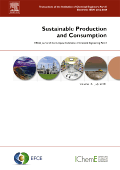
Sustainable Production and Consumption
Scope & Guideline
Championing Environmental Stewardship through Knowledge
Introduction
Aims and Scopes
- Sustainable Production Practices:
Research on methodologies and technologies that enhance sustainability in manufacturing processes, including life cycle assessment, eco-design, and innovative production techniques. - Circular Economy Integration:
Exploration of circular economy principles that support resource recovery, waste minimization, and sustainable material flows within industries, emphasizing recycling and upcycling practices. - Sustainable Consumption Patterns:
Investigation into consumer behavior and preferences regarding sustainable products, including studies on food choices, waste reduction, and the adoption of eco-friendly products. - Interdisciplinary Approaches to Sustainability:
Encouragement of interdisciplinary research that combines insights from economics, sociology, environmental science, and technology to address complex sustainability challenges. - Policy and Governance for Sustainability:
Analysis of the impact of policies and regulatory frameworks on promoting sustainable practices in various sectors, including energy, agriculture, and waste management. - Technological Innovations for Sustainability:
Assessment of emerging technologies and their potential to drive sustainability in production and consumption, such as digitalization, artificial intelligence, and renewable energy solutions.
Trending and Emerging
- Life Cycle Sustainability Assessment (LCSA):
An increasing trend towards comprehensive life cycle sustainability assessments that evaluate the environmental, economic, and social impacts of products and services throughout their entire life cycle. - Food Systems and Sustainability:
A growing body of research focused on sustainable food systems, including studies on food waste reduction, sustainable diets, and the environmental impacts of food production and consumption. - Digital Transformation and Sustainability:
Emerging interest in how digital technologies, including AI and IoT, can facilitate sustainable practices in production and consumption, enhancing efficiency and reducing environmental footprints. - Behavioral Insights for Sustainable Practices:
A surge in research examining the psychological and social factors that influence sustainable consumer behavior, including nudges, social norms, and community engagement strategies. - Climate Change Mitigation Strategies:
Increased focus on strategies for mitigating climate change impacts across various sectors, emphasizing the need for integrated approaches that address carbon emissions and sustainability. - Sustainable Supply Chain Management:
A trend towards exploring sustainable practices within supply chains, including circular supply chains, resource efficiency, and collaboration among stakeholders to enhance sustainability outcomes.
Declining or Waning
- Traditional Waste Management Strategies:
Research focusing solely on conventional waste management practices is decreasing, as the emphasis shifts towards integrated circular economy solutions that promote waste reduction and resource recovery. - Single-Use Product Studies:
Investigations centered around the environmental impacts of single-use products are becoming less frequent, likely due to the growing focus on reusable alternatives and broader circular economy frameworks. - Sector-Specific Sustainability Assessments:
While sector-specific assessments (e.g., only focusing on agriculture or energy) were once prevalent, there is a trend towards more integrated assessments that consider multiple sectors and their interdependencies. - Narrowly Defined Consumer Behavior Studies:
Research that narrowly defines consumer behavior without considering broader social and economic contexts is waning, as studies increasingly incorporate multi-faceted approaches to understanding consumer sustainability. - Isolated Technological Innovations:
Papers focusing solely on isolated technological innovations without context or integration into broader sustainability frameworks are decreasing, as the field emphasizes systemic change.
Similar Journals

Sustainable Futures
Advancing sustainable solutions for a brighter tomorrow.Sustainable Futures, published by ELSEVIER, is a pioneering open access journal dedicated to advancing research in the fields of technology management, operational science, sociology, and political science. Established in 2019, this esteemed journal has quickly positioned itself as a vital resource within the academic community, as evidenced by its impressive 2023 rankings, including Q1 status in Sociology and Political Science. With a focus on innovative and sustainable solutions for contemporary challenges, Sustainable Futures serves as an essential platform for researchers, professionals, and students seeking to explore the intersections between technology, society, and environmental change. The journal's commitment to open access since its inception enhances its global reach and accessibility, ensuring that high-quality research is available to all stakeholders. As the academic landscape continues to evolve, Sustainable Futures is poised to be a critical voice in shaping sustainable practices and innovations from 2019 to 2024 and beyond.
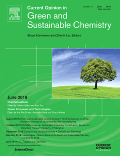
Current Opinion in Green and Sustainable Chemistry
Shaping the Future of Chemistry with Sustainability in MindCurrent Opinion in Green and Sustainable Chemistry, published by Elsevier, is a premier journal dedicated to exploring the rapidly evolving field of green and sustainable practices in chemistry. With an impressive Q1 ranking in multiple categories, including Catalysis, Process Chemistry and Technology, and Waste Management, this journal plays a pivotal role in disseminating innovative research by providing critical insights into sustainable methodologies and their implementation across various industries. The journal aims to gather leading perspectives from experts to facilitate knowledge exchange that drives the global transition towards more sustainable chemical practices. Based in the Netherlands, Current Opinion in Green and Sustainable Chemistry emphasizes high impact, evidenced by its Scopus ranks, notably achieving the 10th percentile in Environmental Science Management, making it indispensable for researchers and professionals keen on advancing sustainable chemistry solutions. This journal offers a blend of open access articles and subscription-based content, ensuring a wide reach and engagement with its audience.
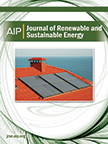
Journal of Renewable and Sustainable Energy
Advancing the Science of Renewable EnergyThe Journal of Renewable and Sustainable Energy, published by AIP Publishing, stands at the forefront of research in the fields of renewable energy and sustainable practices. With an ISSN of 1941-7012, this journal aims to foster innovative research and exchange of knowledge on sustainable technologies and methodologies that contribute to environmental conservation and energy efficiency. Achieving a prestigious Q2 ranking in the category of Renewable Energy, Sustainability, and the Environment, it ranks 135 out of 270 journals in Scopus, signifying its impactful contributions to the field. The journal, active from 2010 to 2024, provides a platform for authors, analysts, and practitioners to disseminate significant findings that can shape future environmental policies and energy frameworks. Although not currently an Open Access publication, it remains an essential resource for researchers dedicated to advancing sustainable development and energy solutions.
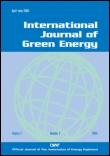
International Journal of Green Energy
Championing innovative research in the realm of sustainability.The International Journal of Green Energy is a premier publication that plays a pivotal role in the field of renewable energy and sustainability. Published by Taylor & Francis Inc, this journal, with ISSN 1543-5075 and E-ISSN 1543-5083, has established itself as a crucial platform for sharing innovative research and developments from 2005 to 2024. With a commendable Q2 ranking in the category of Renewable Energy, Sustainability and the Environment, it ranks 100 out of 270 in Scopus, positioning itself in the 63rd percentile of its field. The journal is dedicated to advancing knowledge and fostering dialogue around green technologies and sustainable practices, providing invaluable insights for researchers, industry professionals, and students alike. Although it does not offer open access options, the journal's commitment to rigorous peer review ensures that only high-quality research is published, making it an essential resource for those seeking to explore and understand the complexities of green energy solutions.
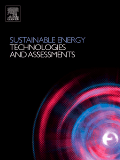
Sustainable Energy Technologies and Assessments
Empowering Innovations in Energy EngineeringSustainable Energy Technologies and Assessments is a prestigious journal published by ELSEVIER, based in the United Kingdom, focusing on the critical field of energy engineering and its intersection with sustainability. Since its inception in 2013, the journal has established itself as a leading platform for disseminating innovative research and assessments of sustainable energy technologies, earning a notable Q1 ranking in both Energy Engineering and Power Technology, as well as Renewable Energy, Sustainability, and the Environment. With an impressive Scopus ranking—#22 out of 272 in Energy Engineering and #40 out of 270 in Renewable Energy—this journal is essential for researchers and professionals seeking to advance their knowledge on cutting-edge developments and assessments in sustainable energy. Although the journal operates on a subscription basis, it remains committed to promoting high-quality research that aligns with global sustainability objectives. Researchers and students alike will find invaluable insights and data that shape the future of renewable energy technologies within these pages.

Recycling
Championing the future of materials efficiency and recycling.Recycling is a renowned international open access journal published by MDPI that has been dedicated to advancing the field of recycling and waste management since its inception in 2015. With a focus on innovative technologies, management practices, and policy frameworks, this journal serves as a platform for researchers, professionals, and students who are eager to explore sustainable solutions in resource recovery and material efficiency. Based in beautiful Basel, Switzerland, Recycling boasts an impressive impact with a 2023 ranking of Q2 in Management, Monitoring, Policy and Law and Q1 in Materials Science (Miscellaneous), signifying its pivotal role in driving forward-thinking research in these critical areas. The journal is indexed in Scopus, with strong performance metrics highlighting its relevance and quality, such as a rank of #42 in Waste Management and Disposal. As an open access publication, Recycling promotes the dissemination of knowledge, ensuring that groundbreaking research is freely available to a global audience. Whether you are a seasoned researcher or a student eager to contribute to the discourse surrounding sustainable practices, Recycling provides a vital resource for those committed to the future of waste management and environmental sustainability.

Green Chemical Engineering
Fostering collaboration in sustainable chemical innovation.Green Chemical Engineering, an esteemed journal published by KEAI PUBLISHING LTD, plays a pivotal role in advancing the field of sustainable chemical engineering. With an Open Access policy since 2020, this journal facilitates the free exchange of cutting-edge research and innovations that address critical environmental challenges. Based in China, it has rapidly gained recognition with impressive category quartiles, ranking Q1 in numerous relevant fields including Catalysis, Chemical Engineering (miscellaneous), Filtration and Separation, and Process Chemistry and Technology. Its presence in Scopus highlights its significance, with top rankings (e.g., Rank #4/19 in Filtration and Separation) placing it in the upper echelons of chemical engineering literature. Designed for researchers, professionals, and students alike, Green Chemical Engineering aims to foster a collaborative platform for the dissemination of pioneering work that contributes to a greener and more sustainable future.
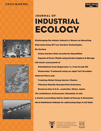
JOURNAL OF INDUSTRIAL ECOLOGY
Exploring the Nexus of Industry and Environmental StewardshipJOURNAL OF INDUSTRIAL ECOLOGY, published by Wiley, is a leading academic journal that focuses on the intersection of industrial practices and ecological sustainability. With an ISSN of 1088-1980 and an E-ISSN of 1530-9290, this journal has established itself as a premier outlet for research in economic, environmental, and social sciences, evidenced by its Q1 rankings in key categories such as Economics and Econometrics, Environmental Science, and General Social Sciences as of 2023. Spanning over two decades from 1997 to 2024, it offers invaluable insights into innovative approaches for designing sustainable industrial systems, informing policy decisions, and advancing interdisciplinary collaborations. While the journal does not currently offer open access options, its high impact in the field—illustrated by its impressive Scopus rankings, where it ranks 5th among 275 in General Social Sciences and 23rd among 233 in General Environmental Science—reinforces its importance to researchers, professionals, and students dedicated to the principles of sustainable development and industrial ecology.

AIMS Energy
Illuminating the Path to Energy ExcellenceAIMS Energy is a leading academic journal published by the American Institute of Mathematical Sciences (AIMS), dedicated to advancing the field of energy research. With a strong commitment to Open Access since its inception in 2013, this journal offers a platform for researchers, professionals, and students to share innovative findings and enrich the discourse in crucial areas such as Energy Engineering and Power Technology, Fuel Technology, and Renewable Energy, Sustainability and the Environment. Recognized for its quality, AIMS Energy holds a respectable impact with a Q3 ranking in multiple categories as of 2023, and it ranks within the top half of its peers in the Scopus database. The journal's objective is to disseminate high-quality research that addresses contemporary challenges in energy and offers sustainable solutions. By fostering collaboration and discussion among various stakeholders, AIMS Energy plays a critical role in shaping the future of energy technologies and policies.

BioEnergy Research
Catalyzing Change through Rigorous ResearchBioEnergy Research is a premier journal published by SPRINGER, dedicated to advancing the field of bioenergy through rigorous scholarship and innovative research. Since its inception in 2009, the journal has emerged as a vital resource for academics, industry professionals, and policymakers involved in the production and utilization of biofuels and other renewable energy sources. With an impressive HIndex and a commitment to quality, it has achieved Q1 status in Agronomy and Crop Science and Q2 rankings in both Energy (miscellaneous) and Renewable Energy, Sustainability and the Environment as of 2023. This positions BioEnergy Research among the top-tier publications in these interconnected fields, offering a platform for disseminating groundbreaking research, practical applications, and critical reviews. Although not open access, the journal's content remains accessible to a broader audience, making it an essential tool for driving the global transition towards sustainable energy solutions. Explore issues spanning from fundamental research to applied methodologies, and contribute to the dialogue on how bioenergy can meet the challenges of a dynamic environmental landscape.